Eschewing sexiness for shame in bringing Vixen to the screen
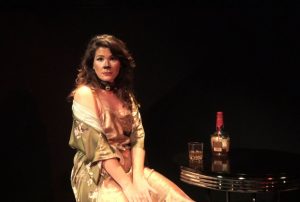 Jessica Walck’s love affair with theater began in The Dining Room in 2003. Since then, she’s not only developed into one of Southwest Florida’s most accomplished actors, but a highly analytical instructor and director with an uncanny ability for getting the most out of her students and cast members.
Jessica Walck’s love affair with theater began in The Dining Room in 2003. Since then, she’s not only developed into one of Southwest Florida’s most accomplished actors, but a highly analytical instructor and director with an uncanny ability for getting the most out of her students and cast members.
Walck’s success 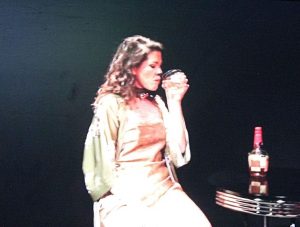 inheres in her penchant for dissecting scripts with the enthusiasm displayed long ago by English teachers while diagramming sentences – and then utilizing what she’s discovered to deconstruct and then reconstruct the playwright’s characters. Her portrayal of Vixen in Lab Theater’s filmed theatrical production of Jeff Goode’s The Eight: Reindeer Monologues this past December is a case in point.
inheres in her penchant for dissecting scripts with the enthusiasm displayed long ago by English teachers while diagramming sentences – and then utilizing what she’s discovered to deconstruct and then reconstruct the playwright’s characters. Her portrayal of Vixen in Lab Theater’s filmed theatrical production of Jeff Goode’s The Eight: Reindeer Monologues this past December is a case in point.
 In case you need a brief reminder, The Eight is a delightfully irreverent holiday comedy in which the members of Santa’s elite sleigh team comment candidly about Vixen’s allegations that Old Saint Nick raped her in the North Pole’s toy factory.
In case you need a brief reminder, The Eight is a delightfully irreverent holiday comedy in which the members of Santa’s elite sleigh team comment candidly about Vixen’s allegations that Old Saint Nick raped her in the North Pole’s toy factory.
Brett Marston directed the show. Since the play was being filmed for broadcast on a computer monitor or television screen, Marston had his actors pretend they were talking to an investigative reporter, documentary style. Goode has each of Santa’s reindeers weigh in on the veracity and propriety of Vixen’s claims. Some believe her; others don’t; and some of those who believe her think she just needs to shut up in order to preserve and protect the 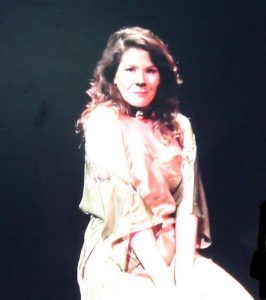 tradition of Christmas and the institution that Kringle’s built over the centuries.
tradition of Christmas and the institution that Kringle’s built over the centuries.
One in five American women has suffered rape, and another 41.8 percent have been victimized by some other form of sexual violence. In raw numbers, 652,676 women were raped in 2019 alone, but if data from non-rape sexual assaults is included, the figure, sadly, surpasses the one million mark.
Fortunately, Walck is not included in the foregoing statistics – although she concedes that she encounters sexism on a daily basis.
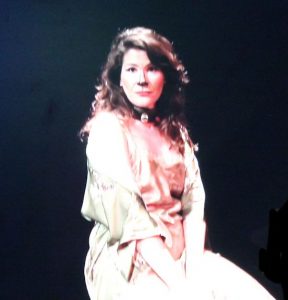 So she approached playing Vixen from a slightly different angle. Instead of focusing on Vixen’s rage, she identified with Vixen’s shame.
So she approached playing Vixen from a slightly different angle. Instead of focusing on Vixen’s rage, she identified with Vixen’s shame.
“She’s this sexy [reindeer] who uses her sex appeal to get what she wants, but goes a little too far,” Jessica comments. “So she internalizes what happened and concludes that she deserved it. That’s what the world tells women about rape, and I think that she actually believes it. There’s a line in that dialogue where she totally blames herself. I aligned with the shame.”
It’s an ingenious slant.
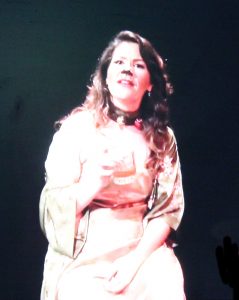 While not everyone (thankfully) has experienced sexual assault or even harassment, shame is a universal emotion. The list of what can prompt shame is both endless and ageless, and there are well-documented links between shame and addiction, eating disorders and sexual abuse. Sexual orientation and gender identity, body image and weight, and lack of success or achievements can certain trigger feelings of shame. But not living up to our family’s, peer’s or society’s expectations is often a primal source of shame. And that type of shame often stays with a person throughout their lives.
While not everyone (thankfully) has experienced sexual assault or even harassment, shame is a universal emotion. The list of what can prompt shame is both endless and ageless, and there are well-documented links between shame and addiction, eating disorders and sexual abuse. Sexual orientation and gender identity, body image and weight, and lack of success or achievements can certain trigger feelings of shame. But not living up to our family’s, peer’s or society’s expectations is often a primal source of shame. And that type of shame often stays with a person throughout their lives.
“We all have a moment in our lives 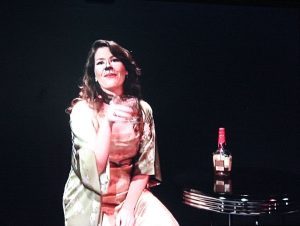 where we feel shame for something and so that was my access into the character,” Walck continues. “She was beating herself up for not getting herself out of the situation. So she assumes responsibility for something that is not her responsibility. I get that. I understand that very much so.”
where we feel shame for something and so that was my access into the character,” Walck continues. “She was beating herself up for not getting herself out of the situation. So she assumes responsibility for something that is not her responsibility. I get that. I understand that very much so.”
But Vixen doesn’t start out accepting blame. She and Walck both know cognitively that a reindeer has the right to dress, walk, talk, 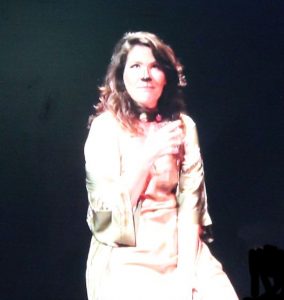 drink and act any way she chooses. Both realize that the only way to prevent sexual violence is to hold offenders, not survivors, accountable for their actions and challenge the thoughts and actions of our peers.
drink and act any way she chooses. Both realize that the only way to prevent sexual violence is to hold offenders, not survivors, accountable for their actions and challenge the thoughts and actions of our peers.
But in our prevailing rape culture, sexual violence is normalized, justified and perpetuated through the use of misogynistic language, the objectification of women’s bodies, and the glamorization of sexual violence. And unlike her nemesis, Vixen is avowedly no saint. She has rubbed shoulders with Hugh Hefner at the 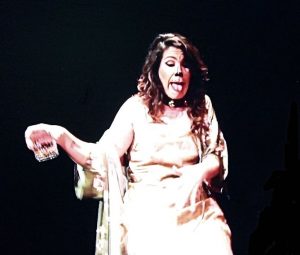 Playboy mansion, and there are those who say the ex-centerfold invites male attention because that, after all, is what she really craves. As is the case with most victims of sexual assault, abuse and harassment, she’s the one who is put on trial for her sexual past. Victim shaming is not confined to humans. It plagues reindeer too.
Playboy mansion, and there are those who say the ex-centerfold invites male attention because that, after all, is what she really craves. As is the case with most victims of sexual assault, abuse and harassment, she’s the one who is put on trial for her sexual past. Victim shaming is not confined to humans. It plagues reindeer too.
“That’s the thing I love so much about acting,” Walck remarks. “There’s so much going on in that piece and any actor can 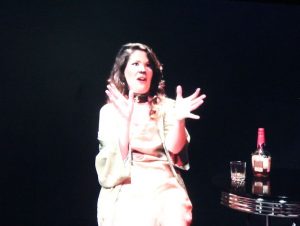 pick what they want and play it to its max.”
pick what they want and play it to its max.”
While that may be true, Walck sensed almost immediately that accentuating Vixen’s sex appeal would be a grave miscue.
“Trying to play the sexy is a trap because Vixen is so much more,” Jessica demurs. “It was a lot of fun just to break that beautiful, delicious seven-page monologue 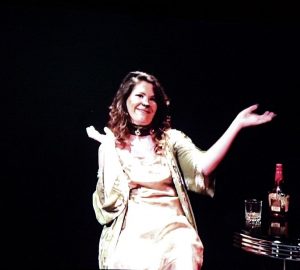 down and determine what Vixen really wanted to say.”
down and determine what Vixen really wanted to say.”
And in Walck’s estimation, she wouldn’t play up her innate sex appeal during an interview with an investigative reporter who’s looking into her allegations that Santa Claus raped her. That’s what got her into her predicament in the first place.
Walck also rejected playing up Vixen’s anger and outrage.
“She’s got a lot of colors, 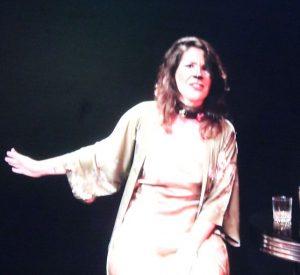 but she has a [surfeit] of guilt. She’s also ashamed of a world that expects her to just take it, including her friends, the other seven reindeer, to varying degrees. But nobody deserves that treatment. So in the end, she’s leaving. She’s basically running away.”
but she has a [surfeit] of guilt. She’s also ashamed of a world that expects her to just take it, including her friends, the other seven reindeer, to varying degrees. But nobody deserves that treatment. So in the end, she’s leaving. She’s basically running away.”
Why?
The answer is poignant.
Vixen is leaving because she’s lost faith in her stable mates  and society in general for choosing to believe a facile lie rather than a painful truth.
and society in general for choosing to believe a facile lie rather than a painful truth.
Being an astute judge of character and possessed of a philosopher’s perspective on the human condition, Walck didn’t end her analysis there. It was also necessary to come to terms with how Vixen feels about her decision to drop her allegations and walk away from the North Pole.
“I told [director] Brett [Marston] that if Vixen has any tears, she’s going to hold them back. There’s this quivering strength beneath what’s she doing, and she doesn’t want to show how hurt she is. She can’t. It’s not something that is in her make-up.”
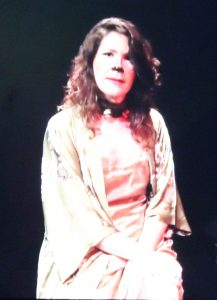 But holding it together isn’t easy.
But holding it together isn’t easy.
“She’s depleted. She’s done. So there’s nothing else for her to do but leave.”
Walck fears that this aspect of her character didn’t come across as powerfully on the screen or a computer monitor as it would have had she been able to perform the role in a theater live on stage.
“Live, it would have been palpable, especially the silences” Jessica postulates. “When you’re communicating something for a character, her wants and objectives, when you’re really going after something and putting yourself into it, you find yourself in it in some way, shape or form. Your spirit 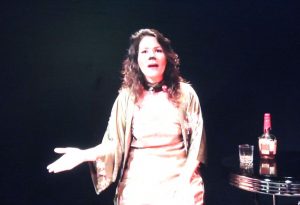 connects to it and everyone in the room can feel it. It’s such a powerful connection to the other actors on stage and the people in the audience.”
connects to it and everyone in the room can feel it. It’s such a powerful connection to the other actors on stage and the people in the audience.”
Like the rest of us, she misses that terribly.
It’s difficult to string dramatic performances together in a daisy chain. If nothing else, respite is needed to stay fresh and engaged. 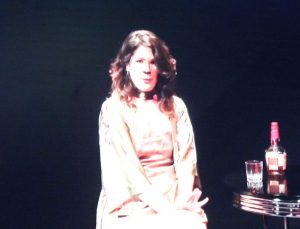 So Jessica likes to alternate dramatic roles and plays with comedies and musicals. But the latter don’t provide the depth of character that thrills her to the tips of her toes. Because what Jessica Walck relishes most are those welcome opportunities to delve into the psychology of a character and uncover what they’re trying to get or say.
So Jessica likes to alternate dramatic roles and plays with comedies and musicals. But the latter don’t provide the depth of character that thrills her to the tips of her toes. Because what Jessica Walck relishes most are those welcome opportunities to delve into the psychology of a character and uncover what they’re trying to get or say.
Walck cites Brooke 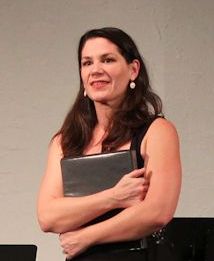 in Other Desert Cities as a role that enabled her to go on just such a psychological journey. But she really learned how to psychoanalyze a complex female character and convert her discoveries into a compelling dramatic performance during her two years at the Neighborhood Playhouse in New York.
in Other Desert Cities as a role that enabled her to go on just such a psychological journey. But she really learned how to psychoanalyze a complex female character and convert her discoveries into a compelling dramatic performance during her two years at the Neighborhood Playhouse in New York.
“That’s where I really learned how to act. It’s about the human experience, about connecting to the character’s humanity rather than just being able to cry convincingly or display emotions on stage such as anger or rage. I got to play a lot of roles like Vixen there and it was really exciting.”
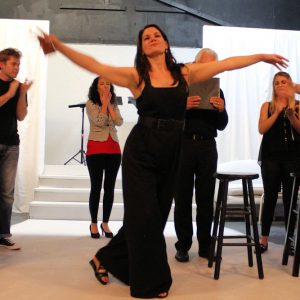 And what’s exciting for TNP patrons and Southwest Florida theater-goers is that not only are there many more dramatic roles in Walck’s future, she’s passing on her approach and all that she’s learned to her KidzAct students and the actors who benefit from her guidance in the shows she’s called upon to direct.
And what’s exciting for TNP patrons and Southwest Florida theater-goers is that not only are there many more dramatic roles in Walck’s future, she’s passing on her approach and all that she’s learned to her KidzAct students and the actors who benefit from her guidance in the shows she’s called upon to direct.
For more on Jessica’s acting, directing and other stage credits, go here.
January 24, 2021.














 Tom Hall is both an amateur artist and aspiring novelist who writes art quest thrillers. He is in the final stages of completing his debut novel titled "Art Detective," a story that fictionalizes the discovery of the fabled billion-dollar Impressionist collection of Parisian art dealer Josse Bernheim-Jeune, thought by many to have perished during World War II when the collection's hiding place, Castle de Rastignac in southern France, was destroyed by the Wehrmacht in reprisal for attacks made by members of the Resistance operating in the area. A former tax attorney, Tom holds a bachelor's degree as well as both a juris doctorate and masters of laws in taxation from the University of Florida. Tom lives in Estero, Florida with his fiancee, Connie, and their four cats.
Tom Hall is both an amateur artist and aspiring novelist who writes art quest thrillers. He is in the final stages of completing his debut novel titled "Art Detective," a story that fictionalizes the discovery of the fabled billion-dollar Impressionist collection of Parisian art dealer Josse Bernheim-Jeune, thought by many to have perished during World War II when the collection's hiding place, Castle de Rastignac in southern France, was destroyed by the Wehrmacht in reprisal for attacks made by members of the Resistance operating in the area. A former tax attorney, Tom holds a bachelor's degree as well as both a juris doctorate and masters of laws in taxation from the University of Florida. Tom lives in Estero, Florida with his fiancee, Connie, and their four cats.